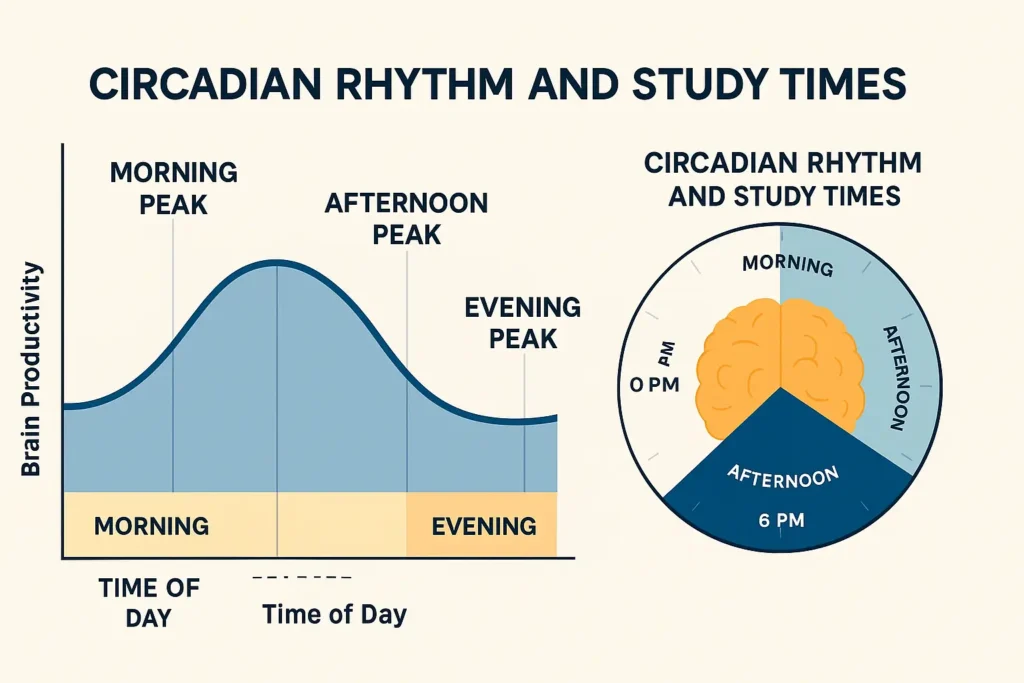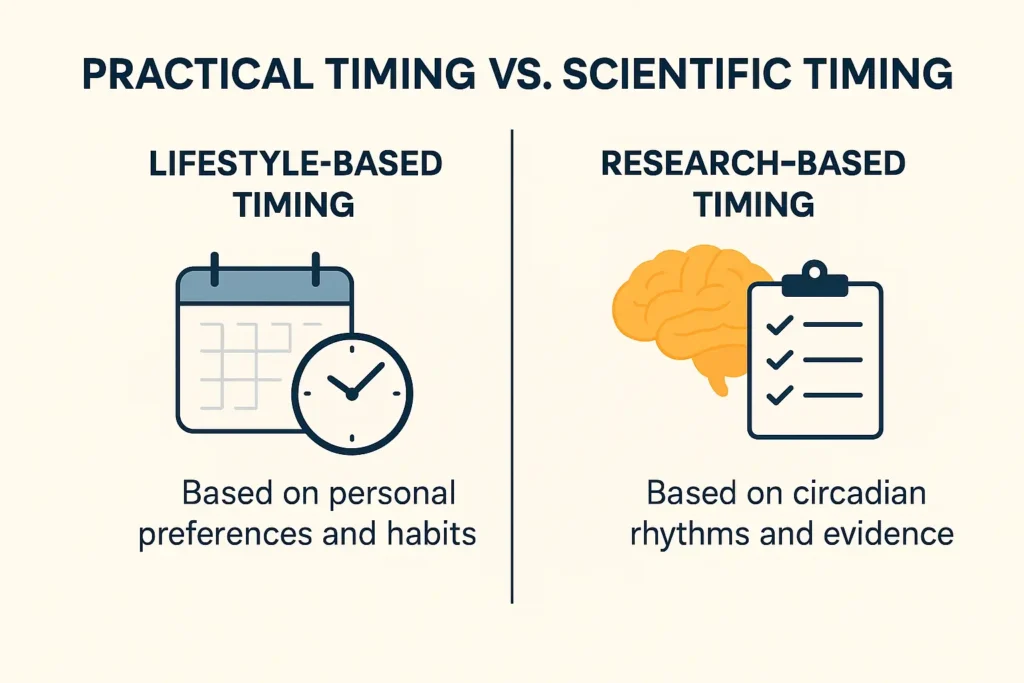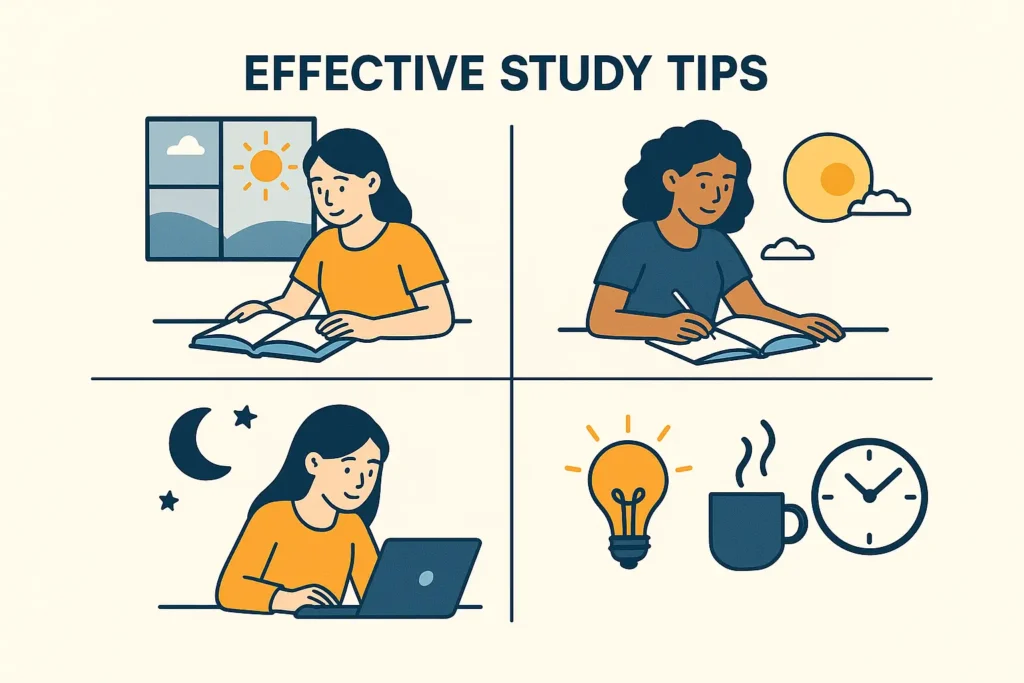Blog
Best Time to Study According to Science

According to research and scientists, the best time to study is 10:00 am and 2:00 pm and 4:00 pm and 10:00 pm, as the brain is most awake and teachable during these hours. However, for deep focus and concentration, one must study between 4:00 am and 7:00 am. Young adults might be a little bit of an exception to this guideline, so it’s important to keep a few things in mind. According to scientists, young adults between the ages of 14 and 24 have circadian rhythms behind either young children or mature adults by roughly 2-3 hours. In this age bracket, the best study time for students can be a little later.

Day Time Affects Students’ Brains?
The time of day can affect students’ brains in simple ways. Students are mostly more focused in the morning, which makes it the best learning time for students. However, it might be more difficult to focus in the afternoon due to a possible decline in energy and all the distractions along the way. Some pupils may feel more creative and capable of tackling problems in the evening. When arranging your work or study schedule and finding the best time for study, keep these patterns in mind for optimal learning and performance.
You might also benefit from learning about the Pomodoro Technique: The Secret Weapon for Better Focus on Shining Study. This method highlights how breaking your work into focused intervals paired with short breaks can help you make the most of your brain’s high-attention windows throughout the day.
Should I Study at Night or During the Day?
In reality, there is no such thing as the best time to study; it differs from person to person when they can be more productive, have the most energy, know their surroundings, and so on. Some are early risers, some work best in the afternoon, and some are night owls; depending on this, we have a breakdown of the benefits of studying at that time and also what is the best time to study.
Morning Learners

Does your brain function at its optimal level in the morning? If so, you are definitely a morning learner. Many students can focus well in the early morning after a good night’s sleep. They can grasp concepts better, solve problems more effectively, and remember things well. They also feel more energetic and refreshed in the morning, making it the best study time for students.
Afternoon Learners

Yes, some students are the most active during the day, unlike most of us who feel tired and sleepy after a good afternoon lunch. Many students can easily integrate information they have learned before during this hour. Many studies suggest that 2 pm to 5 pm are the most effective hours for studying. Their critical thinking and analytical skills also work best during this time.
Nighttime Learners

These are the night owls who are the most productive during the nighttime. Like the afternoon, the nighttime is also quieter, enabling students to focus and recall all they have learned during the day. Also, it is believed that sleeping after studying helps retain information.
Find the Best Time to Study For You
Everyone has a preference for when they’d like to sit and dedicate enough time to studying. Now that you know the benefits of studying both during the night and day, you can also read up on how to decide which time is best for study, keeping these factors in mind. Different study schedules can be the best time to study for different students. If you take the following elements into account, you may determine when you learn best.
Diversion
If your preferred hour is prone to interruptions, such as dinnertime, which can mess up your pattern, it’s ideal to choose some other best time for study. That will be your best time to study and memorise. You have to choose when any kind of hindrance can’t hamper your flow.
Attention
When are you at your sharpest? Consider that various people tend to have superior recollections and alertness at different times of the day. For instance, your visual memory may be greater in the morning, but your capacity for critical thought is at its highest in the afternoon. You need to understand when your mind is in the most alert state.
Regularity
Choose a time that you can consistently adhere to, at least for a few days each week. You need to create the best day routine for study to keep your mind prepared about what is coming, and slowly and gradually, it will automatically fall into the cycle.
Don’t Assume
Just because your peers prefer staying up all night to study, that doesn’t mean that would work for you, either. For all you know, studying in the morning is when you’re most productive. Figure it out by trying both!
Analyse Your Typical Day
Once you start paying attention to how you feel throughout the day and tracking your daily activities, you can see a pattern: You’ll find one long peak of productivity or a few shorter ones instead. Once you know this, you can find out when you are most productive and set the best time for students to study.
Practical Timing VS Scientific Timing

Let’s explore practical and scientific timing to uncover the best study schedule for you.
Practical Timing
Practical timing refers to choosing study hours that fit seamlessly into your daily routine and lifestyle. Factors like your responsibilities, environment, and energy levels play a key role in this. Here’s how to determine your practical timing
- Personal Schedule
- Environment
- Consistency
Scientific Timing
Scientific timing focuses on when your brain is most receptive to learning and retaining information.
According to research:
1. Morning (10:00 am – 2:00 pm): Your brain is most alert, making it ideal for tackling complex topics or analytical tasks.
2. Afternoon (2:00 pm – 4:00 pm): A slight dip in energy occurs, but this is still a good time for lighter tasks or review sessions.
3. Night (8:00 pm – 10:00 pm): Creativity peaks during these hours, making it great for brainstorming and conceptual learning.
4. Early Morning (4:00 am – 7:00 am): This window offers deep focus and clarity, perfect for uninterrupted study sessions.
Understanding your circadian rhythm, which regulates your sleep-wake cycle, is essential for identifying your peak study hours. Aligning your study schedule with your brain’s natural productivity cycles ensures better concentration and memory retention.
Effective Study Tips for Morning, Afternoon, Evening, and Night

Discover practical tips tailored to each part of the day to maximize your study efficiency. Whether you’re a morning riser, an afternoon thinker, or a night owl, these tips will help you excel.
1. Tips for Studying During the Morning
- Start with a Routine
- Have a Balanced Breakfast
- Study in Natural Light
- Tackle Difficult Topics First
- Take Short Breaks
2. Tips for Studying During the Afternoon
- Schedule Review Sessions
- Stay Active After Lunch
- Use Natural Daylight
- Incorporate Group Study
- Set Small Goals
3. Tips for Studying During the Night
- Plan Your Sessions
- Use Calming Techniques
- Stay Hydrated
- Limit Caffeine Intake
- Prepare for Sleep
You can also explore Cambridge University’s study skills resources to learn proven strategies used by top students worldwide. These tools can guide you in crafting a personalized study timetable for optimal performance.
Conclusion
Finding the best time for study according to science is essential for maximising our learning and output. No one solution works for everyone, but we can use the knowledge and advice shared in this blog to choose the best time for students to study. You may be successful in your learning journeys by prioritising your study time and utilising these techniques.



